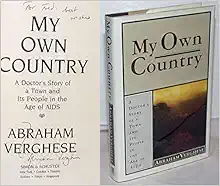
My Own Country: A Doctor's Story of a Town and Its People in the Age of Aids
Hardcover – May 10, 1994
Description
From Publishers Weekly When infectious-disease specialist Verghese, the Ethiopian-born son of Indian schoolteachers, emigrated to the U.S. and settled in Johnson City, Tenn., in the mid-1980s, he finally felt at peace "in my own country" at last. But his work at the Johnson City Medical Center soon led him into a shadow world of Bible-belt AIDS, often without the support of his colleagues. Verghese discovered a local gay community that was then untested for the HIV virus. If revealed, these people's closeted relationships would have, writes Verghese, made them stand out "like Martians." The author tells the stories of several patients, including the gay man who must reconcile with his father and the "innocent" man who has contracted AIDS through a contaminated blood transfusion but who, concerned about society's response to his plight, keeps his disease a secret even though he believes that "this thing, this virus, is from hell, from the devil himself." Verghese reveals his own confusions about homosexuality, immigrant identity and his wife's fears about his health. Writing with an outsider's empathy and insight, casting his chronicle in graceful prose, he offers a memorable tale that both captures and transcends time and place. Paperback rights to Vintage; author tour. Copyright 1994 Reed Business Information, Inc. From Library Journal In fall 1985 Verghese--who was born in Ethiopia of Indian parents--returned with his wife and newborn son to Johnson City, Tennessee, where he had done his internship and residence. As he watched AIDS infect the small town, he and the community learned many things from one another, including the power of compassion. An AIDS expert who initially had no patients, Verghese describes meeting gay men and then eventually others struggling with this new disease. Verghese's patients include a factory worker confronting her husband's AIDS, bisexuality, and her own HIV status and a religious couple infected via a blood transfusion attempting to keep their disease secret from their church and their children. This novelistic account, occasionally overly detailed, provides a heartfelt perspective on the American response to the spread of AIDS. Previewed in Prepub Alert, LJ 1/94. - James E. Van Buskirk, San Francisco P . L . Copyright 1994 Reed Business Information, Inc. From Booklist Infectious disease specialist Verghese is a Christian from subcontinental India who earned his M.D. in Ethiopia, and living in various cultures has helped him to be open-minded toward and supportive of his patients, who currently are the veterans and civilians living in and around Johnson City in east Tennessee. His book covers the five years in the latter 1980s when AIDS began to make itself felt in the area and during which he treated gays, victims of tainted transfusions, and infected spouses. Among the book's fascinating features are its portrayals of the gradually increasing impact of AIDS on the community, the changing relationships between Verghese and other health caregivers and the patients, and the frightening toll the disease took on families, friends, and society. Nor were Verghese himself, his wife, and even his children immune to those grinding forces. Few, if any, books written by someone without AIDS have offered such a perceptive and realistic perspective on this disease and its ramifications. William Beatty From Kirkus Reviews A grim reproof to all who want to deny that AIDS has arrived in America's heartland. For five years in the late 1980s, Verghese was an infectious- diseases specialist in Johnson City, a town in northeastern Tennessee; in that time he saw his AIDS patient load soar from 1 to more than 80. AIDS was brought to Johnson City by way of New York, San Francisco, Miami, and elsewhere by prodigal gay sons who, after a few years of freedom, returned home to die. It was brought by way of a truck stop on the interstate where gay locals congregated for anonymous sex. It was brought by way of transfusions of tainted blood. With the observant--but never dispassionate--eye of the clinician, Verghese notes everything about the remarkable, varied patients who seek his help, including: Will Johnson, a Bible Belt entrepreneur who believes AIDS comes from Satan; Luther Hines, whose bitter rage keeps him alive while his body is consumed by tuberculosis, candidiasis, and other infections; Vickie McCray, who faithfully cares for the unfaithful husband who infected her as he sinks into AIDS dementia. Verghese leaves nothing to the imagination as he describes the gruesome effects of the opportunistic infections that attack those with AIDS. He surprises us with unpredictable instances of compassion (friends changing diapers on a man with uncontrollable diarrhea) and cruelty (from members of the medical profession). But this is also Verghese's personal story, which dovetails with that of his patients. As a foreign-born doctor of Indian descent tending outcast patients, he too was a bit of an outsider in rural Tennessee. He is touchingly honest about his own flaws and about the strain his all-consuming medical practice placed on his marriage. Verghese, who has written for the New Yorker and other publications, offers a powerful testimony to the courage of those who live and die with AIDS and of those who care for them. (Book- of-the-Month Club alternate selection; Quality Paperback Book Club alternate selection; author tour) -- Copyright ©1994, Kirkus Associates, LP. All rights reserved. Abraham Verghese is Professor of Medicine and Chief of Infectious Diseases at Texas Tech Health Sciences Center, El Paso, Texas. Read more
Features & Highlights
- A doctor who works with people with AIDS daily offers a look at the impact of AIDS on a small Tennessee town, as townspeople respond to the disease's presence





